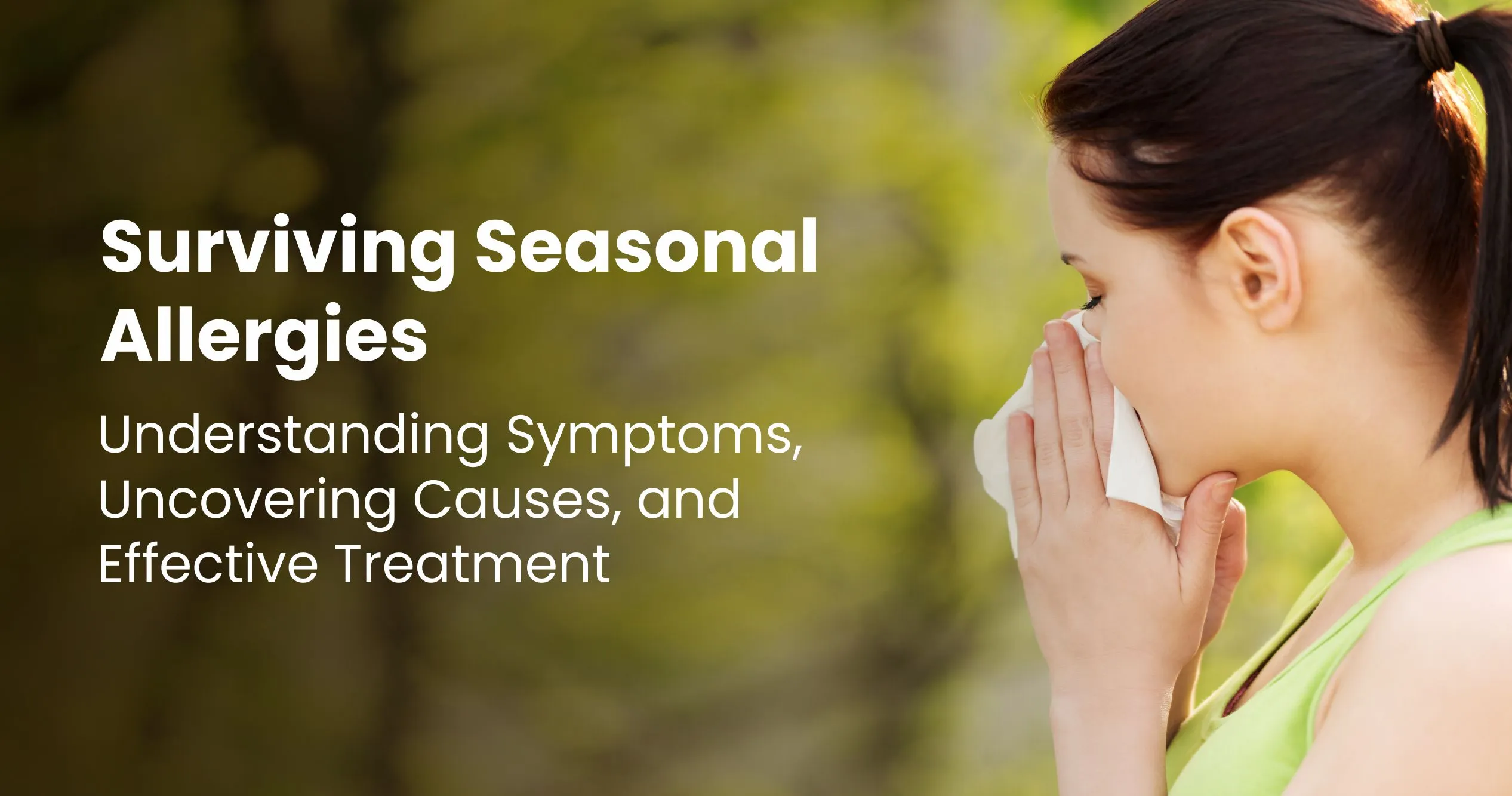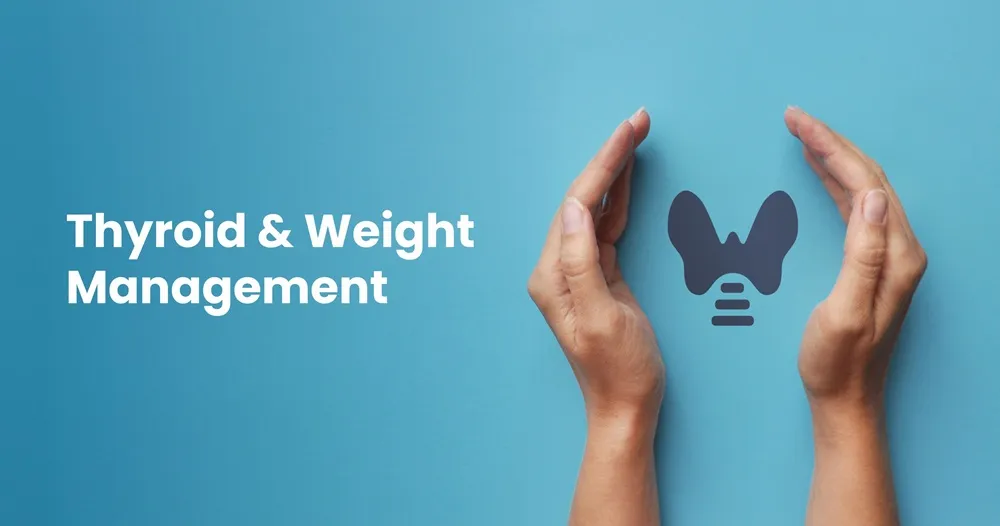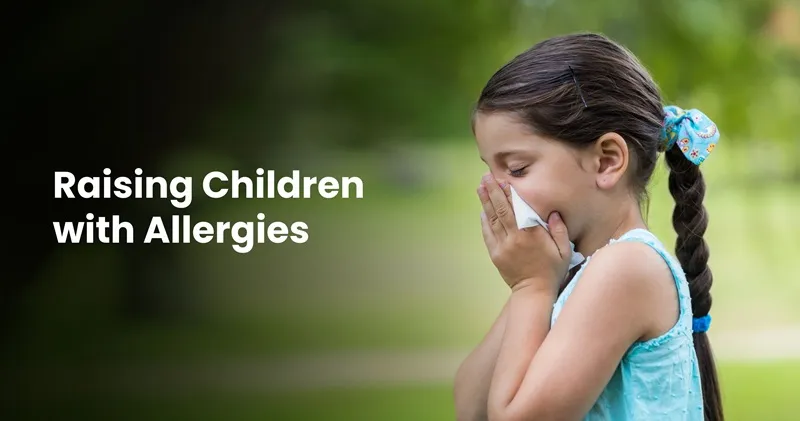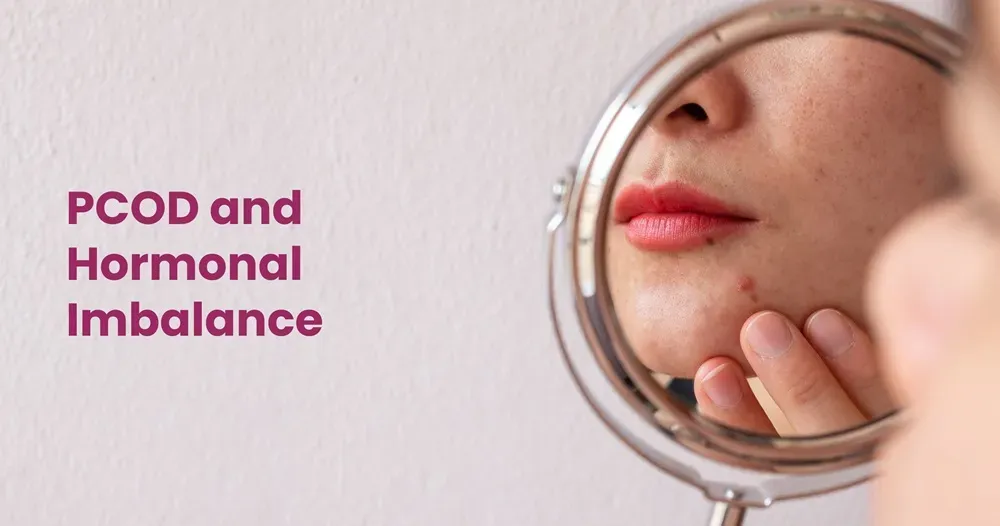Surviving Seasonal Allergies: Understanding Symptoms, Uncovering Causes, and Effective Treatment
Mar 19, 2024

Have you ever noticed sudden changes in your body that randomly appear and disappear? This can happen without any specific pattern for any period and at any intensity. If yes, then these are seasonal allergies. It is more commonly known as allergic rhinitis. In this condition, the body often shows signs and symptoms such as itchiness, redness, sneezing, headache, watery eyes, etc.
These signs can usually also be linked to the common flu. However, most people show signs of allergies for certain reasons, such as dirt, pollen, etc., and they are often not viral diseases.
Let us find out more about the symptoms, causes and treatment of seasonal allergies.
Understanding the Symptoms of Seasonal Allergies
The symptoms of seasonal allergies are quite similar to the common flu. However, the intensity of the symptoms may vary greatly. This is generally dependent on how immune the person is to the allergen or how long the person has been exposed to the allergen. Here are some of the most common symptoms of seasonal allergies:
- Watery Eyes
You may often notice that your eyes get extremely watery during a particular season. This can also be accompanied by slight redness and itchiness. In severe cases, it can also be associated with slight swelling around the circle of the eye or puffiness.
- Itchiness in the mouth and nose
Patients often complain of a constant desire to scratch the inside of their nose or mouth. They may feel it to be externally dry and rough. In severe cases, the inner lining of the throat or the mouth may also be damaged or worn out, leading to swelling.
- Excessive formation of mucus
The patient often experiences a runny nose or excessive salivation. It is also associated with a postnasal drip, where the drainage from the nose often slips down to the back region of the throat. This drip can be thick or watery and is linked to a sign of sinusitis.
Severe symptoms of seasonal allergies may also include -
- High fever
- Fatigue or tiredness.
- Constant back pain or even full-body pain.
- Snoring due to the blockage or congestion caused by the formation of mucus.
- Pain or blockage in the ear canal.
Uncovering Causes of Seasonal Allergies
To be able to treat seasonal allergies, it is first important to understand their cause. This can help you stay away from the causative agent and prevent most cases of allergies. For every patient with seasonal allergies, the allergen is different. However, it is important to identify the cause before moving on to the treatment. Here are some of the common causes of seasonal allergies:
different. However, it is important to identify the cause before moving on to the treatment. Here are some of the common causes of seasonal allergies:
Pollen
These are the small seed-like structures of plants. They often release a powdery substance that is spread in the air. Since it is very light and can easily travel by wind currents, it can spread across a large distance. Pollen allergies are very common in the spring season.
Molds
Molds are fungi. They are commonly seen as small patches in different colours, such as black or green. Molds are very common in damp areas, such as washrooms or the attic. Thus, it is important to keep the surfaces clean and dry at all times. Mold allergies are highly common in the monsoon season when the moisture content in the air is at a peak.
Dust
Dust allergies are the most common type of seasonal allergies. While dust can remain prevalent all year long, it is highly common during the autumn season or when the level of humidity is high in the air. People who have allergies to dust can also catch allergies while cleaning or dusting within their house.
Effective Treatments of Seasonal Allergies
The very first step of an effective treatment plan for seasonal allergies is to identify the causative agent or the allergen. Removing the allergen from around the patient can help in reducing the intensity of the disease and even minimize the chances of recurrence.
To identify the allergen, it is important to form a pattern and identify the situation the patient has been in every time the allergy has occurred. Here are some of the most effective treatments for seasonal allergies:
- In mild cases, doctors may prescribe an antihistamine drug. This drug helps reduce the signs and symptoms of an allergy, such as watery eyes and a runny nose.
- If you have signs of a dry or swollen nasal passage, throat, or mouth, doctors may prescribe a corticosteroid nasal spray. This can help reduce swelling and lubricate the area. It also protects the epithelium layer from rupture or further damage.
- If you have a stuffed sinus area, the doctor may recommend some oral decongestants. You can also use the water pipe technique to clear out your sinus tract. In this technique, the person is asked to tilt on one side and insert water inside their nose from the other side. The water passes through the nasal tract and comes out the excess mucus from the other side.
Winding Up
Seasonal allergies can be frustrating and debilitating, but with the right knowledge and approach, you can effectively manage your symptoms and regain control over your well-being. The best treatment for seasonal allergies is early detection and removal of the allergen from around the patient.
If you find yourself struggling to manage your symptoms or seeking personalized guidance, consider consulting with the experts at Apollo Diagnostics. Our team of experienced professionals can provide comprehensive allergy testing, custom treatment plans, and ongoing support to help you effectively manage seasonal allergies.
FAQs
1. What happens if excess mucus is formed in seasonal allergies?
In severe cases, this can also be associated with pain around the temple of the cheekbones and the centre region of the forehead.
2. What are allergens?
In most people, seasonal allergies are caused by certain harmless agents, commonly known as allergens.
3. How to find out about the allergens?
There are generally two ways of identifying seasonal allergies: getting the allergy test done and using trial and error.
4. What is the treatment plan for allergies?
The most common drugs include antihistamines and corticosteroid nasal pumps.
Related Blog Post
Blog Categories
- Child Health
- Mens Health
- Women's Health
- Mental Health
- Health Myths & Facts
- Fitness
- Nutrition/Recipes
- Remedies
- Weight Management
- Stress Management
- Health Supplements
- Addiction Management
- Disease Management
- Allergy
- Anemia
- Arthritis
- Asthma
- Autoimmune Diseases
- Blood Pressure
- Cancer
- Deficiencies
- Dengue/Malaria/Chikungunya
- Diabetes
- Eye Problems
- Heart Diseases
- Hepatitis
- HIV/AIDS/STD
- Hormonal Imbalance
- Infection/Flu/Viral
- Kidney
- Liver
- Menstrual Problems
- Pregnancy
- Skin & Hair Problems
- Stomach Ailments
- Thyroid
- Others
- Health Checkups
- Diagnostics/Pathology
- Lifestyle & Wellness
- Covid
- Medical Tests
- Cholesterol
- Health Tips
- Parent Care/Old Age
- Lungs
- Food Intolerance








